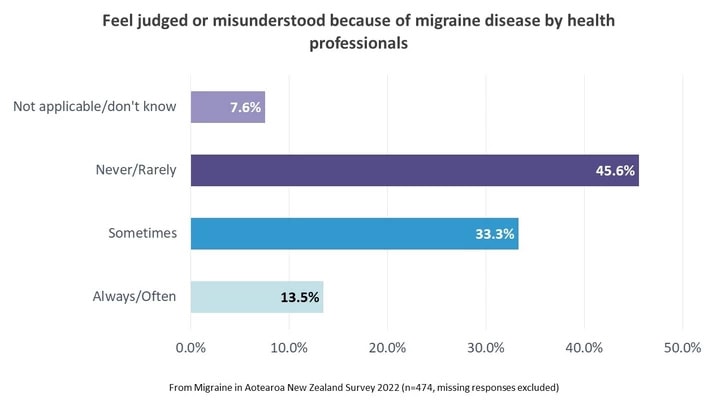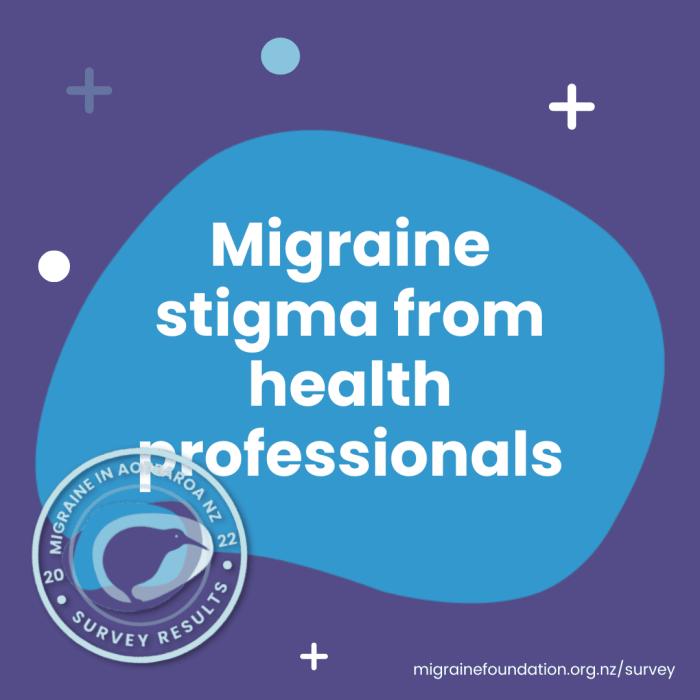Results from the Migraine in Aotearoa New Zealand Survey 2022
The term “gaslighting” has come into common use over the past few years, as a way of describing a manipulative type of behaviour that can occur in abusive relationships. It covers a range of strategies used to make another person doubt their thoughts, emotions and even their sanity. The gaslighter will lie and deny, question the other person’s memory, minimise their feelings and shift blame in order to undermine their sense of self and reality.
There’s another type of gaslighting that can affect people with migraine disease – medical gaslighting. This is when a health professional dismisses, minimises or trivialises a person’s health concerns or physical symptoms. The person is told that their symptoms are imagined, psychosomatic, “all in their head” or due to stress, anxiety or mental illness or they may not be given any explanation. In all cases their symptoms are not taken seriously, not investigated and the person is not given appropriate treatment or follow-up.
Medical gaslighting most often happens to women – and women are more likely to have migraine disease. And female health professionals can practice medical gaslighting just as well as male health professionals.
Respondents to our 2022 Migraine in Aotearoa New Zealand Survey recounted experiences of medical gaslighting, for example:
“Migraine feels very stigmatised as a disease – not taken seriously. Had experiences of very unhelpful and stigmatising views of migraines from medical professionals (people with migraines are just “crazy chronic pain patients”, “all in their head”, or accusations patients are looking for secondary gain).”
“GENDER BIAS IS REAL. If you are a woman, you are not taken seriously. I took a male friend to A&E with a migraine, they took X-rays and gave him pain meds. Every woman I’ve taken has been given a prescription for paracetamol and sent on their way home to discuss it with GP. Migraines are not accepted as a long-term, debilitating disability by the medical industry or society as a whole, and they should be.”
“Doctors told me (as his mother) we just had to accept the pain and migraines and treat it as a disability… Neurologists, GPs and clinicians didn’t treat him appropriately and were sometimes damaging and demeaning. They made you feel like it was psychological, not physical.”
“When you head into urgent care or A&E, because they cannot see the migraine they think you are having them on.”
“Being brushed over or told I was too young to be suffering.”
And from the question in the survey about feeling judged or misunderstood because of migraine disease by health professionals, 42% out of 474 respondents said they sometimes, often or always felt this way.

If you are feeling judged by health professionals or if you feel like you are not being believed or listened to, you are not alone. But there are some things you can do. If you can, for example, if it’s your GP or a private specialist who isn’t taking you seriously, find another doctor who you can trust and will treat you with respect. In the emergency department, where you don’t have a choice about who you see, take a letter from your trusted doctor that documents your condition and what treatments are needed. For many health encounters, it can be helpful to take a support person who can advocate on your behalf, ask questions and hold the health professional to account.
The point of gaslighting is to make a person believe that what they’re experiencing is not real or valid. Migraine symptoms can be confusing, diverse and strange and there is no diagnostic test to validate the experience of pain. But this does not excuse health professionals from their duty of care, which is to treat their patients and do no harm. Medical gaslighting is harmful. If it happens to you, call it out if you can, but have confidence in yourself. Migraine is only “all in your head” in the sense that it is a neurological condition and affects how your brain functions. Some health professionals may need to be reminded of this.


